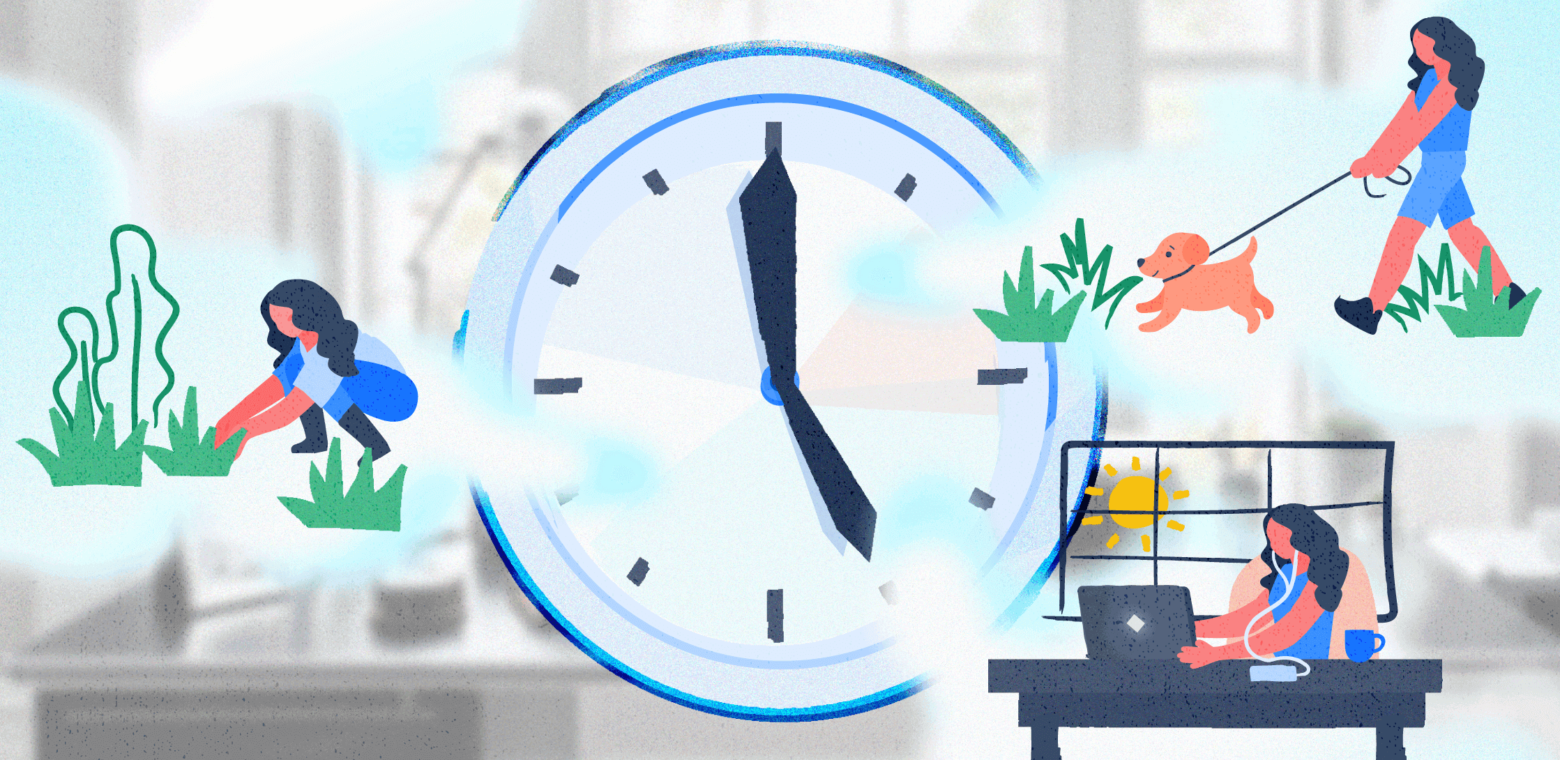Use these shutdown rituals to make the mental shift from work-time to me-time.
Remember that movie Groundhog Day? Where Bill Murray experiences the same day over and over and over and heartwarming hilarity ensues? Working from home can feel like a lot like that (minus the heartwarming hilarity). The hours meld together because there’s no natural divider to separate work time from personal time.
Maybe that’s ok with you. There are plenty of people who prefer to blend their work and personal lives. The type who walk away from their laptop before five o’clock, then are perfectly happy to answer emails from their phone while they make dinner. These folks are known as “work-life integrators”. But many others, myself included, need to feel like they’ve left work for the day before they can relax. We’re known as “work-life segmentors.”
Understanding where you are on the integrator-segmentor spectrum is a major step forward in your quest for work-life balance because it helps you set boundaries accordingly. Here’s how to tell.
Work-life integrators…
- Transition fluidly from work to personal life and back again
- Dress like they’re chillin’ at home when they’re working from home
- Like to “talk shop” at the dinner table
- Don’t mind answering emails and chats after hours (within reason, of course) because they popped out for that CrossFit class in the middle of the afternoon
Work-life segmentors…
- Have well-defined times when they are working – once they’re done for the day, they’re done
- Wear office-appropriate attire (at least from the waist up!) when they’re working from home
- Tend to personal needs like errands and fitness outside of working hours
- In extreme cases, don’t keep photos of their family and friends on their desks
For those of us on the segmentor end of the spectrum, a shutdown ritual is the key to making the mental shift from work-time to me-time. Even integrators find a ritual helpful – although for them, it’s more of a “nice to have.” It helps us achieve work-life balance and generally reduces our cognitive load, which, in turn, helps us recharge.
The ritual doesn’t have to be complicated. According to Trevor Noah, it can take as little as three seconds:
My shutdown ritual is to close my laptop and do a round of high-fives with my family. (Because if we still like each other after a day of distance learning and working from home, that’s a victory.) But that’s just me. So I reached out to my network and collected a boatload of shutdown ritual ideas to share.
10 shutdown rituals for remote workers
- Intention and identity setting. As much as we’ve all been embracing authenticity lately (e.g., the sound of kids running around infiltrating your Zoom meetings) revealing more of our full selves, we still play different roles when we’re working versus when we’re on our own time. When work is done, do you become parent of the year? Beast-mode athlete? Loving partner? Close your laptop, and finish these two sentences: “Now that my workday is done, I’m freed up to be the best __<role>__ I can be. And I want to make sure that __<what you want to accomplish or a result you’re aiming for>__.” Boom. Intention set. (Hat-tip to business growth coach Shawn Johal.)
- Walk your dog (or yourself). This is a popular shutdown ritual, especially when the weather is warm. It could be a five-minute stroll around the block or a half-hour trip to the dog park. Either way, you’ll get the benefit of fresh air in your lungs and sunlight on your skin for that all-important vitamin D production, which helps regulate your mood and wards off depression.
- Exercise. I never cease to be amazed by people who can bring themselves to do a workout after just completing the mini-marathon that is the modern workday. If that’s you, then good on ya. The endorphin rush that comes after a workout helps wash away the stress of the day.
- Meditation. Speaking of washing away stress, just five to ten minutes of meditation can get the job done. If you’re new to the practice, there are loads of free apps and podcasts that offer guided meditations. These collections of Oprah-approved apps and short-but-effective podcasts are good places to start browsing. (Hat-tip to marketing maven Stella Garber.)
- Change your environment. Dim the lighting in your home and put on a different playlist. And those “real clothes” you’re wearing? Ditch ’em in favor of comfy pants and a hoodie.
- Unplug. Turn your laptop off. Mute notifications on all the work apps on your phone. While you’re at it, consider whether you need those apps on your phone at all. An important step in pushing back against “always on” culture is setting yourself up so you actually can’t work from anywhere at any time. Strategically subversive FTW!
- Knock out a chore. After you’ve cleared away the coffee mugs and dishes on your desk, tend to a small routine task. Bring in the mail, feed your pets, water your plants, or chip away at the pile of laundry waiting to be folded.
- Fun with the kiddos. I heard from parents who have end-of-day dance parties in their living rooms or spend a few minutes on a jigsaw puzzle or Lego build with their kids. For younger children in particular, the end of Mom or Dad’s workday is a big moment because they (finally!) have you all to themselves. If, like me, you were pretty grumpy the fifth time you had to shoo your child out of your office today, taking a moment to reconnect reassures them that they’re loved and valued. (Hat-tips to recruiting manager Jake Foster and engineering team lead Steffan Schluff.)
- Beer/cocktail/wine o’clock. Nothing says “I am not at work right now” like booze, amiright? Pouring yourself a drink at the end of the day is a time-honored tradition. And even though you’re shutting down for the day, this is a good chance to have a virtual happy hour with a teammate. Because talking shop or venting over a glass of wine can be a nice way to close out the day. But be mindful. As we all know (but sometimes forget), it’s easy to become overly reliant on drinking as a coping mechanism. If you start to question your relationship with alcohol, talk to someone about it – even if that’s just a friend. There’s no shame in being self-aware and practicing self-care in this way.
- Cook dinner. One of the best things about not having a commute is that you have more time to cook from scratch. And let’s face it: our usual reliance on fat-, preservative-, and sodium-packed convenience foods is bad news for both our wallets and our health. I heard from several people who said they feel like they’ve truly left work once they’re in the kitchen chopping vegetables or out on the deck firing up the grill. That’s a big win for your body, your budget, and your work-life balance.


